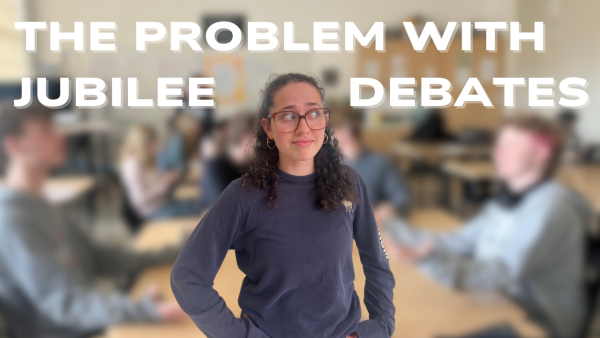
Have you ever seen those channels on YouTube that have wild thumbnails and provoke “real people” to have conversations that are typically controversial? Jubilee, a YouTube channel that gained popularity during the COVID-19 pandemic, describes its mission to “provoke understanding & create human connection.” Their sister channel, Nectar, focuses on romantic connection. As of Nov. 13, these channels have collectively received 36 million views within the last four weeks. Much of this viewership can be attributed to viral moments from their episodes being reshared on other social media platforms, such as TikTok and Instagram. In addition, some popular streamers and YouTubers dedicate their entire channels to reacting live to their videos. Jubilee has always focused on bridging the gap between groups of people with different perspectives, allowing them to have conversations; but are they productive conversations, or are they pointless?
Jubilee has three intentionally controversial and political series: “Middle Ground,” launched in 2017; “Spectrum,” introduced in 2019; and the newest series, “Surrounded,” which began airing in 2024. In all three series, participants with varying viewpoints on a specific topic engage with one another and use various methods to examine their similarities and differences. The purpose of all three series is similar: uniting people despite their differences of viewpoint and demonstrating what true discourse among “ordinary” people looks like.
Assessing whether Jubilee successfully achieves these objectives is very subjective and multifaceted; frequently, viewers experience confirmation bias, having their preconceived notions affect how they perceive the video’s sincerity and efficacy.
Franklin senior Moe Too was drawn to Jubilee’s content by the 20 vs. one videos from the “Surrounded” series, specifically “Can 1 Woke Teen Survive 20 Trump Supporters?” Too states, “It was interesting to see how different Trump supporters reacted.” When watching videos promoting controversial conversations that need nuance, educating yourself and finding your own opinions and alignment is crucial. Too agrees, “I believe the videos to be more for entertainment rather than education. It’s not a reliable source of information and [can be] a way for misinformation to spread.”
Many famous and beloved YouTubers and streamers have shed light on these channels with a standard format: reactions. Some of these YouTubers, including Cody Ko, Hasan Abi, and Adin Ross, either stream or record videos reacting to the channels, each with their own niche. Abi, political commentator and streamer, typically responds to Jubilee’s “Surrounded” videos on livestream. He reacts to the political climate on his YouTube channel, critiquing both Democrats and Republicans. On the other hand, before he took some time away from content creation, Ko would also respond to the more lighthearted dating game series hosted by Jubilee, his videos prompting more viewership to their channel. The attention the channels can garner from these other content creators is an exchange that benefits both creators.
On various social media platforms, clips from their series are reposted on Jubilee’s official accounts, fan accounts, and by everyday people. Too believes that “Clips uploaded to social media don’t give [a] fair representation of the full debates. It’s important to get a full grasp of what the entire video is about, rather than from a short clip; [otherwise] many misunderstandings could arise.” These short videos usually have large comment sections that offer perspectives on the topics discussed in the videos. Occasionally, some comments lead to hostile conversations that can quickly escalate into cyberbullying based on social and political beliefs.
“Many debates get quite divisive, especially topics focused around abortion, communism, and the LGBTQ+ community. I feel most topics are handled immaturely, many people speak over each other, not truly listening to the different perspectives,” Too states. He brings up a great point: many individuals come only to share their voices and not to hear others. It’s likely challenging for the production team and the casting directors to know how someone will behave until the camera is rolling.
Jubilee’s channel became increasingly political in the weeks leading up to the 2024 election. Jubilee has featured politicians like Democrat Pete Buttigieg, the U.S. secretary of transportation, and political activists and commentators like Charlie Kirk and Ben Shapiro. Meanwhile, the other people featured in the videos, “ordinary people,” are expected to debate or converse with political commentators who debate for a living and are typically more actively educated, ultimately leading to a power imbalance. “1 Politician vs. 25 Undecided Voters (Feat. Pete Buttigieg)” from Jubilee’s “Surrounded” series consisted of many voters unhappy with the political climate and unsure of who to vote for. There were many unproductive arguments, and Buttigieg could only get through to a few undecided voters, urging them to vote for Kamala Harris just days before the election.
Why is this important? Many people, especially in the U.S., turn to the media for education. Although Jubilee claims to only “provoke understanding,” they might also, knowingly or unknowingly, influence real people’s choices in the nation’s future.
Now that the 2024 election has been decided, Jubilee has returned to its typical content without politicians or commentators. The variety of participants had impacted Too’s perception of the videos: “I assume enthusiasts and professionals have more educated arguments than others.”
While these videos are thought provoking and fun to watch, they should not be taken seriously, used as an example, or be the way to find your political affiliation. Many of the issues require a lot of research and nuance but are turned black and white in each video. There is also a level of ignorance to the gamification of serious issues that are hurting and killing real people worldwide, where these types of conversations about them are in no way helping anyone who’s actively hurt by the problems. When you scroll through Jubilee’s channel, nearly every political video is separated by two prominent colors and two parties.
In their series “Middle Ground,” they hope to “explore whether two different groups of people, opposed in their beliefs, can come together empathetically and find [the] middle ground,” according to their website. Still, the videos typically consist of seemingly fake and disingenuous conversations that ultimately go nowhere, a middle ground generally not found.
YouTube is the second most-used social media platform in the world. As of 2021, 81% of all U.S. adults use the platform, meaning companies like Jubilee have the power to share diverse social and political perspectives with a larger audience than has ever been possible until now. That might be the only positive of this channel. Hearing different opinions and attitudes is valuable as long as you don’t rely on them entirely. When utilized effectively, social media can enhance our critical thinking abilities and transform us into more informed citizens and voters. Jubilee’s political debate videos highlight a crucial conflict between entertainment and genuine conversation and prompt us to reflect on our role as consumers of media. Are we merely passive viewers, or can we transform these provocative conversations into meaningful dialogue that fosters critical thinking and the sharing of perspectives?


































